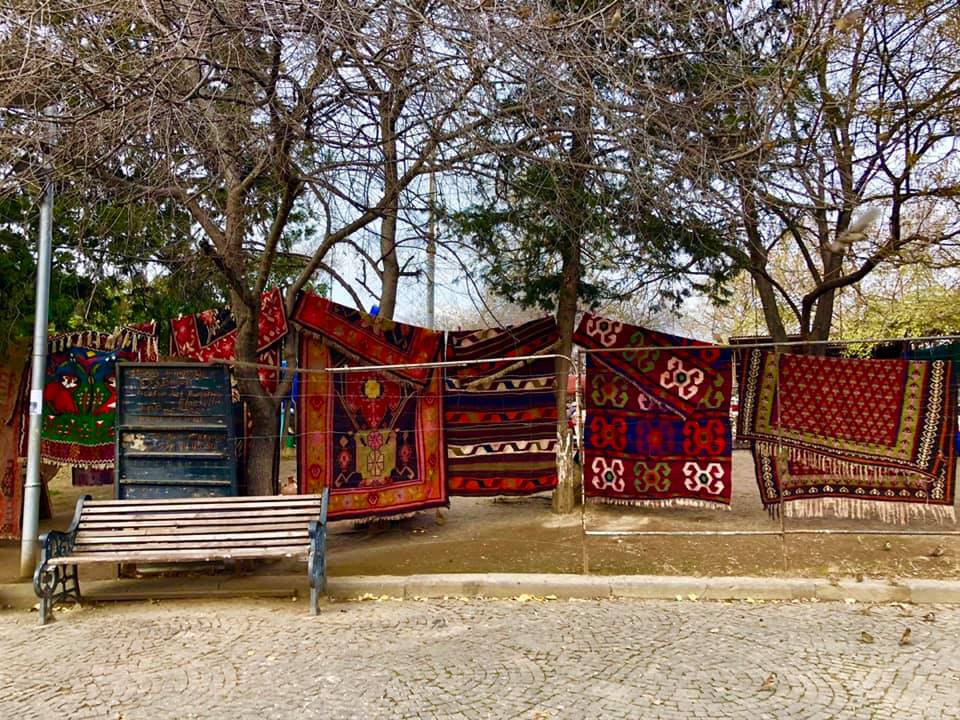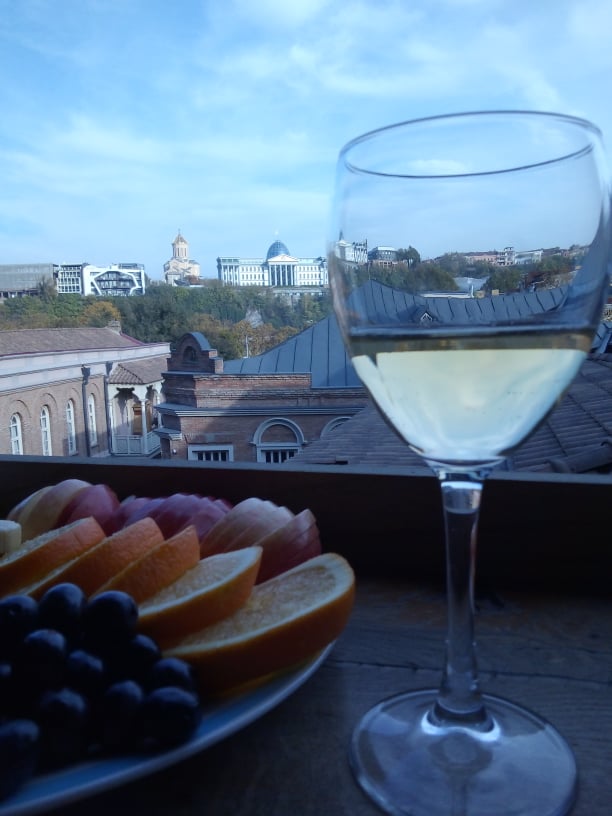Masks, barriers, high prices: post-corona tourism in Georgia
Georgia is opening tourist season after a four-month break due to the coronavirus pandemic.
Starting June 15, hotels and other tourist amenities will be open to domestic tourists, and from July 1, the country will receive the first foreign travelers.
Foreign media sources call Georgia a safe destination for tourism. Forbes magazine included two cities – Tbilisi and Batumi – on the list of destinations that are particularly safe from coronavirus.
The Washington Post, the European Best Destinations website, and the Czech travel and business portal TTG, among others have also described Georgia as a safe place to travel.
- Georgia’s plans to rejuvenate tourism
- Georgian gov’t announces plan to support construction sector through crisis
The government is trying to take advantage of Georgia’s reputation as a country which has successful fought off the pandemic; Prime Minister Giorgi Gakharia stated that Georgia has the opportunity to rebrand itself as a country free from coronavirus.
How is Georgia preparing for the tourist season and what are the expectations of those working in the industry?

What countries do tourists in Georgia come from?
On July 1, almost three and a half months after the shutdown, Georgia’s two major airports in Tbilisi and Kutaisi are reopening.
The full list of countries that are reopening flights to Georgia from July 1 is not yet known. So far, the only information available is that Georgia will open its skies only to those countries where the epidemiological situation is stable.
However, on some airline ticket sites such as Skyscanner, it is already possible to buy tickets to Tbilisi from Moscow – one of the pandemic hotspots – starting July 1. Tickets are being sold by Aircompany Armenia and the Belarusian airline Belavia.
Before tourist season officially opens, Georgia agreed to establish a so-called “green corridor” with several countries, namely Israel, the Czech Republic, Lithuania, Latvia, Estonia, Austria and Germany.
This means that citizens from these countries can travel to Georgia without having to be quarantined. For example, citizens of the Czech Republic are not required to self-isolate for two weeks when they travel to Georgia. Georgian citizens traveling to Czechia will also be given the same treatment.
Georgia expects to start receiving international tourists from July 1.
However, data from the National Statistics Service of Georgia shows that none of the top five countries from which tourists usually travel to Georgia—Azerbaijan, Armenia, Russia, Turkey, and Ukraine—appear on the list of green corridor countries. The epidemiological situation in the majority of them is rather serious, especially in Armenia and Russia. Amiran Gamkrelidze, the head epidemiologist in Georgia, says that at this stage, opening the borders with Armenia would be dangerous.
As for Ukraine, the Georgian Tourism Administration reports that there are currently negotiations between the two countries to start rescheduling flights. People will be able to purchase tickets to Kyiv and back starting July 1.
Skyscanner is also selling tickets from July 1 from Minsk-Tbilisi and Istanbul-Tbilisi, as well as from Munich-Tbilisi.
Budget airline Ryanair is also ready to reopen all flights to Georgia that were available before the pandemic.
Negotiations are ongoing with several countries, and it is not yet possible to predict how many tourists to expect, says head of the Georgian Tourism Industry Alliance Shalva Alaverdashvili:
“So far, we don’t have any information about it. But I can say with certainty that our regulations are a lot lighter than in other countries around the world.”
Quarantine or proof of negative diagnosis – how will tourists be examined on the border?
Georgia’s new tourism regulations were developed with the help of the Ministry of Health, National Tourism Administration, and private companies.
However, they are still being developed.

There is less than a month left before Georgia starts accepting foreign guests, but it is still unknown what procedure there will be for tourists on the border before they will be allowed to enter the country.
Security procedures for tourists entering the country will not last more than an hour, says Prime Minister Giorgi Gakharia.
There are several different proposals being considered—a 72-hour quarantine for tourists; demanding tourists show official proof of a negative diagnosis issued within the last 72 hours; or the third option—testing on the border.
If the regulations are too strict, there will be no point in opening the borders to tourists because no one will want to come, says Saba Kiknadze, founder of the tourism company Georgian Hospitality Group. He was one of the people involved in creating the new regulations.
“How exactly passengers will be checked on the border remains an open question. I believe that they should have a choice between either being tested on the border or undergoing a mandatory quarantine,” says Kiknadze.
Nika Samadashvili has been working with tourist groups for six years. He is rather sceptical about the possible influx of tourists starting July 1, since, in his opinion, it will be difficult to put these new rules into practice:
“Travel will become very expensive. For example, the test that everyone must pass before crossing the border costs about $100. For a family of four, that adds up to $400. ”
How tourism infrastructure will operate
In case the new border regulations seem unclear, the Ministry of Health has already issued general recommendations for all those associated with the tourism sector, including food services, tour operators and guides, and employees at hotels and pools.
These rules state that guides, drivers and tourists need to take everyone’s temperature before each tour.

Everyone must wear masks on public transport and inside buildings, and the driver’s seat should be separated from passengers by a transparent protective barrier. Passengers must not be crowded into a vehicle. In addition, the new rules state that air conditioning cannot be turned on in cars, since, according to epidemiologists, the increased air circulation helps spread the virus.
In restaurants, cafes, hotels and in all enclosed spaces where tourists are served, surfaces must be cleaned several times a day with a special solution.
Door and window handles, railings, and elevator buttons must be disinfected every two hours.
Special disinfecting floor mats soaked with disinfectant for cleaning shoes must be placed at all building entrances, and employees, such as those who welcome guests at hotel entrances, for example, must sit behind a special transparent barrier.
Expectations of tourism businesses
Rusudan Japaridze, founder of the tourist company Karva Travel, the Tourism School, and the “Infoguide” group on Facebook, was also involved in developing the new regulations.
She says that at first, the Ministry of Health suggested very strict and complicated regulations, but then decided to take the interest of private businesses into consideration, as well as the fight against coronavirus.
“For example, the Ministry of Health has not changed the rules for public transport. A transparent barrier in a minivan will greatly complicate both air circulation and driver’s visibility through the rear-view mirror, which is dangerous. In addition, the issue of air conditioning is still under discussion,” she says.
The problem is that this year, vacationing in Georgia will be more expensive for tourists due to new rules, says Japaridze:
“Prices, of course, will rise, as we’ll have to buy electronic thermometers, masks, gloves, and transparent barriers. There will be a big expenditure differential, and therefore prices will rise.”
Elena Inauri, a representative from Lilat Travel & Events, has been giving domestic tours for many years. Her company is also preparing to receive tourists. Elena says that after the introduction of the new rules, prices for services will increase significantly:
“Say renting one bus coss 300 lari [around $94] and we usually divide this cost among 50 people. Now we’re only going to be able to fit 25 people iin a bus, so the cost of the service will rise significantly.”
Cafes and restaurants with open-air spaces reopened on June 1. From June 8, restaurants will be able to start serving customers indoors as well. But some of these new rules also apply to them.
All customers must wear masks when they’re not eating.
Before guests enter the building, they must have their temperature taken, and those with a temperature higher than 37 C will not be permitted to enter. Tables must be placed at least two meters apart. There will also be a limited number of people allowed to sit at each table. Employees will be required to wear special equipment.
Mariam Bebiashvili, head of the sales and marketing department at GMT group, despite the new regulations, prices remained the same at the restaurants in the Funicular Complex and at Puri Guliani, which reopened on June 1.
“Our customers understand the new rules. So far, no one has complained, but that’s not surprising. It seems that the pandemic has not had too much of an effect on human relations and emotions,” she says.
The Georgian regions are also getting ready to welcome tourists.
The Korsha Hotel is located in Khevsureti, a region high in the mountains on the northern slope of the Caucasus Range. In recent years, this has become one of the most popular mountainous tourist destinations.
The hotel is busy preparing for June 15th. This year, they expect to see more domestic tourists than foreigners.
Hotel owner Marina Gigauri says service will be more expensive:
“Our expenses have risen significantly. Supplies have risen in price. In addition, we must buy masks, gloves, and disinfectants for ourselves. We will need to hire new staff. Before the pandemic, we worked as a family and hired only two employees. But now, we cannot disinfect everything constantly by ourselves,” she says.
The situation in hostels is even more complicated. Their customers—budget tourists—, are mostly young people. Several strangers can stay in one room at the hostel. In a pandemic, many tourists are unlikely to take such a risk.
In addition, this year, when travel has become more expensive, hostel-goers are likely to stay home.
Tsitsi Gogsadze, the owner of Terrace Hostel in the center of Tbilisi, is still trying to come up with a way to keep his business afloat:
“We can go in a different direction and turn the hostel into a guest house or open a cafe. The fact is that most hostels were unable to cope with the new reality and almost all of them closed. Hostels will no longer have customers, because staying in the same room with strangers is now dangerous. It is also risky for me, and I do not want to create problems for anyone else. And if I turned it into a guest house, one family would stay in one room, and rooms would be rented separately, so we’d be able to stay open.”
The head of the Georgian Tourism Industry Alliance Shalva Alaverdashvili believes that this year it will be difficult to continue serving tourist groups:
“Many countries will wait to hear the results from other countries before making any decisions. This is the observation stage, and prices are dictated by demand. No one is factoring profit into their prices, they are just trying to save their business. If they are able to sell anything at all, that’s a good situation.”
Founder of Karva Travel Rusudan Japaridze has no doubt that there are many who will want to visit Georgia in the post-COVID reality.
“Since there is this desire to open borders, it means that the market is demanding it, and that there will be demand once they are reopened. But desire is one thing, and reality is different. If a country quarantines its citizens for two weeks after they return from vacation, no one will want to travel under these conditions. That is why the “green corridor” was established, so that people in these countries will be able to travel without having to undergo quarantine. And for now, apparently, we should be counting on tourists from these countries.”
In any case, Saba Kiknadze, founder of the Georgian Hospitality Group, is certain that it’s better to open the borders and take a chance than to wait:
“We are living in a new reality in which we must be constantly prepared for these kinds of viruses. Words won’t mean anything; we’ll only see in practice. In any case, even if this approach turns out to be unsuccessful, it will still be a useful learning experience for us. There are people who cannot do without travel and cannot be stopped. If they know that Georgia is a safe place in terms of COVID-19, they will definitely come. ”


















